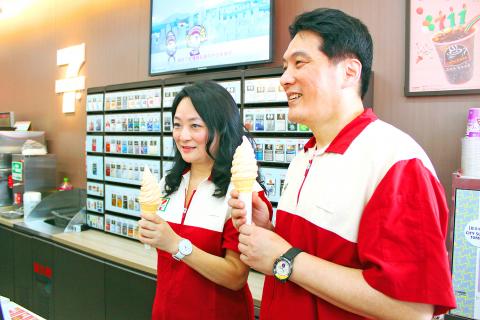President Chain Store Corp (統一超商) yesterday opened its 5,000th 7-Eleven convenience store, in Greater Kaohsiung, a year ahead of plans, as convenience stores have increasingly become an integral part of life for Taiwanese.
Since it opened the first 7-Eleven store in Taiwan in 1980, President Chain has cornered a competitive market with a diversified operating model and a nearly 50 percent market share.
With more than 10,000 convenience stores in operation in a nation of 23 million people, sustaining profitability has become a major challenge for operators. However, the market leader yesterday said the market is not yet saturated.

Photo: Chen Yu-cheng, Taipei Times
“Lifestyles in Taiwan are in transition, and customer spending habits and preferences are changing, which means the retail sector is entering a new era of development,” the Chinese-language Apple Daily’s online news site yesterday quoted President Chain chairman Alex Lo (羅智先) as saying.
With this change in mind, Lo said the number of stores was not important, but the products and services President Chain could offer its customers are.
Lo was interviewed as the company launched its newest store in Greater Kaohsiung’s Neimen District (內門) yesterday, a day after the company reported its cumulative sales for the first half of the year had hit a record level.
Sales in the first six months totaled NT$101.44 billion (US$3.38 billion), an increase of 3.59 percent from the same period last year, the company said in an e-mailed statement.
The company, which reported NT$2.97 billion in net profit in the first quarter with earnings per share of NT$2.86, has not yet released its second-quarter profit report.
On Wednesday, domestic rival Taiwan FamilyMart Co (全家便利商店) reported sales of NT$4.91 billion last month, the highest figures for June in the company’s history, with accumulated sales in the first half rising 5 percent year-on-year to NT$27.31 billion.
President Chain attributed the strong earnings to rising sales of beverages, as well as increasing e-commerce and online shopping revenues, according to the statement.
Domestic subsidiaries such as cosmetics retailer Cosmed (康是美) and parcel delivery unit President Transnet Corp (統一速達), and overseas units including Philippine 7-Eleven and Shanghai Starbucks also reported higher sales, President Chain said.
The company said sales growth momentum should continue this month, driven by various marketing activities designed to take advantage of purchases made during the summer vacation and the FIFA World Cup.
Lo said that the company has opened stores in all the major cities and townships of the nation and would continue to open more stores.
“Sometimes, I can’t help wondering how many convenience stores Taiwan can accommodate,” Lo was quoted as saying. “Basically, the convenience store business in Taiwan is unique in the world. It is just so convenient.”
By adopting larger stores and offering more value-added services, such as online shopping and offering tickets for public transportation, the nation’s major convenience store chains have developed into the model of a one-stop shop.
In the first five months of the year, they posted total sales of NT$117.8 billion, up 5.4 percent year-on-year and accounting for 26.71 percent of the nation’s total retail sales, data from the Ministry of Economic Affairs showed last month.

Semiconductor shares in China surged yesterday after Reuters reported the US had ordered chipmaking giant Taiwan Semiconductor Manufacturing Co (TSMC, 台積電) to halt shipments of advanced chips to Chinese customers, which investors believe could accelerate Beijing’s self-reliance efforts. TSMC yesterday started to suspend shipments of certain sophisticated chips to some Chinese clients after receiving a letter from the US Department of Commerce imposing export restrictions on those products, Reuters reported on Sunday, citing an unnamed source. The US imposed export restrictions on TSMC’s 7-nanometer or more advanced designs, Reuters reported. Investors figured that would encourage authorities to support China’s industry and bought shares

FLEXIBLE: Taiwan can develop its own ground station equipment, and has highly competitive manufacturers and suppliers with diversified production, the MOEA said The Ministry of Economic Affairs (MOEA) yesterday disputed reports that suppliers to US-based Space Exploration Technologies Corp (SpaceX) had been asked to move production out of Taiwan. Reuters had reported on Tuesday last week that Elon Musk-owned SpaceX had asked their manufacturers to produce outside of Taiwan given geopolitical risks and that at least one Taiwanese supplier had been pushed to relocate production to Vietnam. SpaceX’s requests place a renewed focus on the contentious relationship Musk has had with Taiwan, especially after he said last year that Taiwan is an “integral part” of China, sparking sharp criticism from Taiwanese authorities. The ministry said

US President Joe Biden’s administration is racing to complete CHIPS and Science Act agreements with companies such as Intel Corp and Samsung Electronics Co, aiming to shore up one of its signature initiatives before US president-elect Donald Trump enters the White House. The US Department of Commerce has allocated more than 90 percent of the US$39 billion in grants under the act, a landmark law enacted in 2022 designed to rebuild the domestic chip industry. However, the agency has only announced one binding agreement so far. The next two months would prove critical for more than 20 companies still in the process

CHANGING JAPAN: Nvidia-powered AI services over cellular networks ‘will result in an artificial intelligence grid that runs across Japan,’ Nvidia’s Jensen Huang said Softbank Group Corp would be the first to build a supercomputer with chips using Nvidia Corp’s new Blackwell design, a demonstration of the Japanese company’s ambitions to catch up on artificial intelligence (AI). The group’s telecom unit, Softbank Corp, plans to build Japan’s most powerful AI supercomputer to support local services, it said. That computer would be based on Nvidia’s DGX B200 product, which combines computer processors with so-called AI accelerator chips. A follow-up effort will feature Grace Blackwell, a more advanced version, the company said. The announcement indicates that Softbank Group, which until early 2019 owned 4.9 percent of Nvidia, has secured a